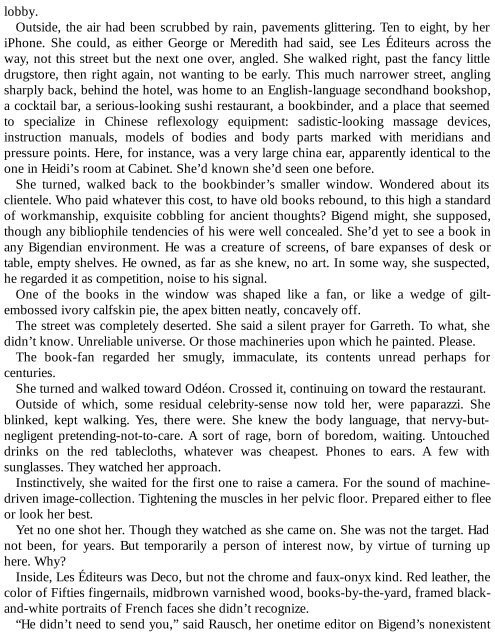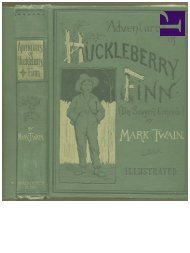You also want an ePaper? Increase the reach of your titles
YUMPU automatically turns print PDFs into web optimized ePapers that Google loves.
lobby.<br />
Outside, the air had been scrubbed by rain, pavements glittering. Ten to eight, by her<br />
iPhone. She could, as either George or Meredith had said, see Les Éditeurs across the<br />
way, not this street but the next one over, angled. She walked right, past the fancy little<br />
drugstore, then right again, not wanting to be early. This much narrower street, angling<br />
sharply back, behind the hotel, was home to an English-language secondhand bookshop,<br />
a cocktail bar, a serious-looking sushi restaurant, a bookbinder, and a place that seemed<br />
to specialize in Chinese reflexology equipment: sadistic-looking massage devices,<br />
instruction manuals, models of bodies and body parts marked with meridians and<br />
pressure points. Here, for instance, was a very large china ear, apparently identical to the<br />
one in Heidi’s room at Cabinet. She’d known she’d seen one before.<br />
She turned, walked back to the bookbinder’s smaller window. Wondered about its<br />
clientele. Who paid whatever this cost, to have old books rebound, to this high a standard<br />
of workmanship, exquisite cobbling for ancient thoughts? Bigend might, she supposed,<br />
though any bibliophile tendencies of his were well concealed. She’d yet to see a book in<br />
any Bigendian environment. He was a creature of screens, of bare expanses of desk or<br />
table, empty shelves. He owned, as far as she knew, no art. In some way, she suspected,<br />
he regarded it as competition, noise to his signal.<br />
One of the books in the window was shaped like a fan, or like a wedge of giltembossed<br />
ivory calfskin pie, the apex bitten neatly, concavely off.<br />
The street was completely deserted. She said a silent prayer for Garreth. To what, she<br />
didn’t know. Unreliable universe. Or those machineries upon which he painted. Please.<br />
The book-fan regarded her smugly, immaculate, its contents unread perhaps for<br />
centuries.<br />
She turned and walked toward Odéon. Crossed it, continuing on toward the restaurant.<br />
Outside of which, some residual celebrity-sense now told her, were paparazzi. She<br />
blinked, kept walking. Yes, there were. She knew the body language, that nervy-butnegligent<br />
pretending-not-to-care. A sort of rage, born of boredom, waiting. Untouched<br />
drinks on the red tablecloths, whatever was cheapest. Phones to ears. A few with<br />
sunglasses. They watched her approach.<br />
Instinctively, she waited for the first one to raise a camera. For the sound of machinedriven<br />
image-collection. Tightening the muscles in her pelvic floor. Prepared either to flee<br />
or look her best.<br />
Yet no one shot her. Though they watched as she came on. She was not the target. Had<br />
not been, for years. But temporarily a person of interest now, by virtue of turning up<br />
here. Why?<br />
Inside, Les Éditeurs was Deco, but not the chrome and faux-onyx kind. Red leather, the<br />
color of Fifties fingernails, midbrown varnished wood, books-by-the-yard, framed blackand-white<br />
portraits of French faces she didn’t recognize.<br />
“He didn’t need to send you,” said Rausch, her onetime editor on Bigend’s nonexistent



